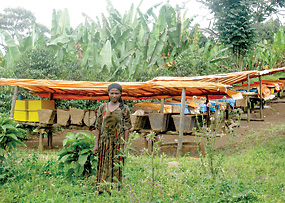More online
When local residents are allowed to make rules about managing nearby forests, the forests are more likely to provide greater economic benefits to households and contain more biodiversity, two U-M researchers and a colleague conclude from an analysis of forest practices in tropical developing countries of East Africa and South Asia.
Lauren Persha and Arun Agrawal of U-M and Ashwini Chhatre of the University of Illinois used evidence from more than 80 forest sites in six tropical countries to test how local participation affects social and ecological benefits from forests.

A woman tends a beekeeping farm at a forest margin in Ethiopia. U-M research shows that local participation in managing forests leads to greater economic benefits for households and increased biodiversity. Photo by Tadesse Gole.
The social benefits include access to forest products that households rely on for their subsistence, such as firewood, fodder for livestock and timber for housing. The main ecological benefit is higher biodiversity in the tropical forests. The team’s results appear March 25 in the journal Science.
“There are substantial disagreements among scientists about whether it’s possible to achieve both economic and ecological benefits together from forests, but little work to understand conditions that might lead to this,” says Persha, lead author of the paper and a postdoctoral researcher at the School of Natural Resources and Environment. “Our study is one of very few that has been able to do this kind of analysis in a systematic way across a large number of cases and countries.”
Persha and her colleagues analyzed patterns of biodiversity conservation and forest-based household livelihoods at 84 study sites. Tree species richness was used as the indicator of forest biodiversity.
The percentage of households that depend significantly on a forest for subsistence livelihoods was used as an indicator of the forest’s livelihood contributions. A sustainable forest system was defined as one in which both tree species richness and livelihood contributions were above average.

The researchers found that most cases were a mixed bag, where either tree species richness or livelihood dependence were below average. But in 27 percent of the cases, both biodiversity levels and livelihood dependence were above average, meeting the criteria for a sustainable forest.
In determining which factors helped to explain these outcomes, the analysis showed that forests are significantly more likely to be sustainable when local users have a formally recognized right to participate in forest rulemaking, while unsustainable forests are more likely when users do not have this right.
“It’s a lesson for governments about how to make policies to manage and govern their forests,” said Agrawal, professor and research associate dean at SNRE.
The authors state that their findings are particularly relevant for small forest patches in regions with high population density — instances that present special challenges for achieving sustainability.
Hundreds of millions of people in the tropics depend on forests. In recent years, governments in nearly two-thirds of the developing world have tried to involve rural households and organizations in forest management. Often, the goal is to improve both social and ecological results by giving local residents incentives to manage forests sustainably.
Such reforms have doubled the area of forest land under community management in the past 15 years. But experts disagree over whether allowing local people to participate in forest rulemaking improves forests or leaves them worse off — and most studies do not examine the effects of this practice.
IFRI was started by Elinor Ostrom, winner of the 2009 Nobel Prize in economics, and currently is housed at SNRE and coordinated by Agrawal. Persha is a key researcher in the program.
The study is one of the first research products of a new Social Sciences Annual Institute launched by the Office of the Vice President for Research and the Rackham School of Graduate Studies.

